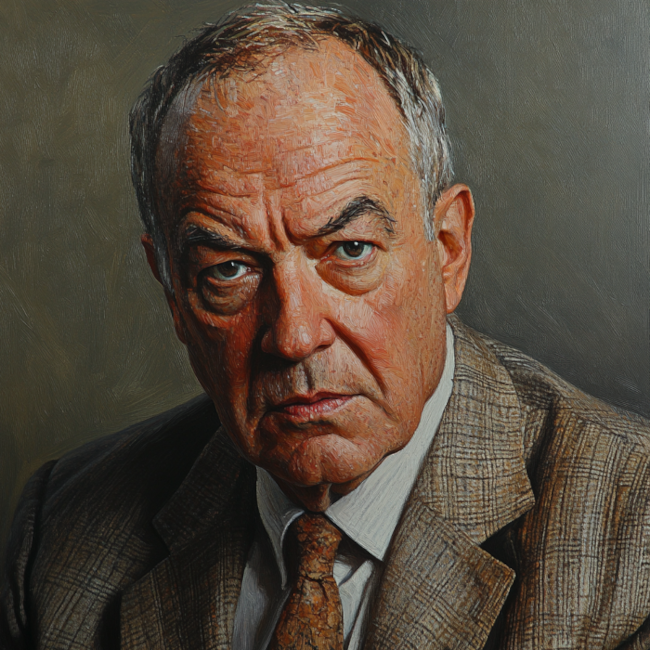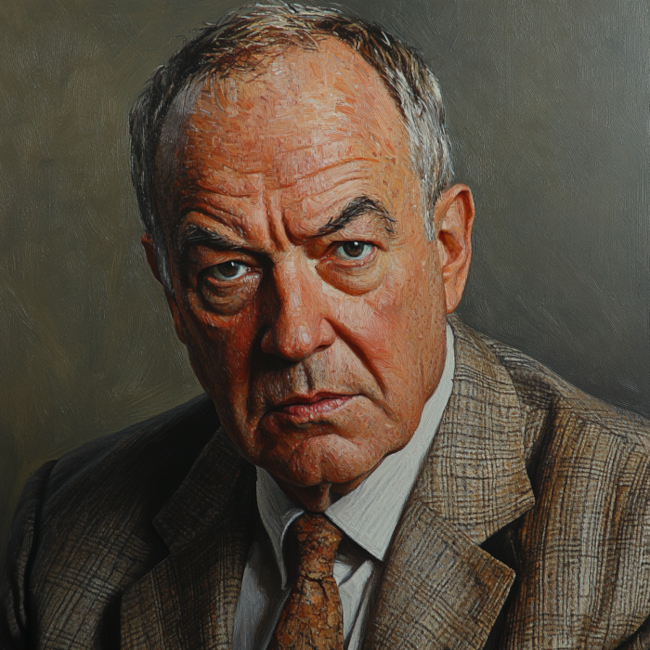


Vladimir Nabokov (1899–1977) was a Russian-American novelist, poet, translator, and entomologist, best known for his novel "Lolita", which remains one of the most controversial and acclaimed works of 20th-century literature. Nabokov's distinctive style is characterized by his intricate use of language, complex narrative structures, and themes that blend beauty, morality, and the grotesque. He wrote in both Russian and English, producing significant works in both languages, and is celebrated for his linguistic dexterity, rich symbolism, and literary innovation. Nabokov was also an accomplished lepidopterist, studying butterflies throughout his life.
Birth and Family Background: Vladimir Vladimirovich Nabokov was born on April 22, 1899, in St. Petersburg, Russia, into a wealthy and aristocratic family. His father, Vladimir Dmitrievich Nabokov, was a prominent liberal politician, journalist, and lawyer, while his mother, Elena Ivanovna Rukavishnikova, came from a family of nobility. Nabokov grew up in an intellectually stimulating environment, and his family was deeply cultured, fostering his love for literature, art, and science.
Education and Early Interests: Nabokov had a privileged upbringing, receiving a private education from tutors and becoming fluent in Russian, English, and French from an early age. He displayed an early talent for literature, writing his first poems at the age of seven. He was also passionate about butterflies, which became a lifelong interest. After the Russian Revolution of 1917, the Nabokov family fled to Crimea, and eventually emigrated to Western Europe to escape the political upheaval in Russia.
Exile and University Education: The Nabokovs settled in Berlin for a time, and Vladimir went on to study Slavonic and Romance languages at Trinity College, Cambridge, graduating in 1922. His time in Cambridge further cemented his love for English literature, and he began writing poetry and fiction in Russian while living in Western Europe.
Berlin and Early Russian Works: After university, Nabokov moved to Berlin, where he joined the vibrant community of Russian émigrés. Writing under the pen name Vladimir Sirin, he began publishing poems, short stories, and novels in Russian. His early works often explored themes of exile, memory, and identity, reflecting his experience as an émigré. Notable works from this period include "Mary" (1926), his first novel, which dealt with the pain of separation from one's homeland, and "King, Queen, Knave" (1928), a darkly humorous exploration of relationships and betrayal.
"The Defense" (1930): In 1930, Nabokov published "The Defense" (also translated as "The Luzhin Defense"), a novel about a chess prodigy named Luzhin whose obsession with chess leads to his psychological breakdown. The book explores themes of obsession, genius, and isolation, blending Nabokov's passion for chess with his interest in the complexities of the human mind.
Move to Paris and Later Russian Works: In 1937, Nabokov left Berlin for Paris to escape the increasing danger posed by the Nazi regime. While in Paris, he continued to write in Russian and published notable works such as "Invitation to a Beheading" (1938), a Kafkaesque novel that depicts a man awaiting execution in a surreal, absurd world. This novel, with its focus on individuality and the oppressive nature of totalitarian systems, is often seen as a reflection of Nabokov's disdain for both fascism and communism.
Move to the United States (1940): In 1940, following the outbreak of World War II, Nabokov emigrated to the United States with his wife, Vera, and their son, Dmitri. In America, Nabokov began teaching literature at Wellesley College and later at Cornell University, where he became known for his engaging and unconventional teaching style. During this time, he transitioned to writing primarily in English, producing some of his most famous and critically acclaimed works.
"Bend Sinister" (1947): "Bend Sinister", published in 1947, was Nabokov's first major novel written in English. The book is a political dystopia that critiques totalitarianism, a theme that Nabokov often revisited. It tells the story of a philosopher, Adam Krug, who struggles against an oppressive regime. The novel reflects Nabokov's opposition to authoritarian ideologies and his belief in individual freedom.
"Lolita" (1955): Nabokov's most famous and controversial work, "Lolita", was published in 1955. The novel tells the story of Humbert Humbert, a middle-aged literature professor who becomes obsessed with Dolores Haze, a twelve-year-old girl whom he nicknames Lolita. Written in the first person, "Lolita" is both a psychological study of obsession and an exploration of moral ambiguity. The novel's subject matter—pedophilia—made it highly controversial, leading to initial rejections by American publishers. It was first published in Paris by Olympia Press, and despite the controversy, it became an international bestseller and established Nabokov's literary fame.
"Pnin" (1957): Nabokov followed "Lolita" with "Pnin", published in 1957. The novel centers on Timofey Pnin, a Russian émigré professor teaching at an American college, and it is a humorous exploration of the challenges faced by an intellectual who is culturally displaced. "Pnin" showcases Nabokov's characteristic empathy for characters who are outsiders, blending humor with poignancy.
"Pale Fire" (1962): Another of Nabokov's major works, "Pale Fire", was published in 1962 and is considered one of his most ambitious and experimental novels. The book is structured as a 999-line poem written by the fictional poet John Shade, with extensive commentary provided by Charles Kinbote, an unreliable narrator who reveals more about himself than about the poem. "Pale Fire" is known for its meta-fictional elements and its examination of the nature of authorship, reality, and the tension between art and interpretation. The novel is often praised for its ingenuity and complexity.
"Ada or Ardor: A Family Chronicle" (1969): In 1969, Nabokov published "Ada or Ardor", an elaborate, multi-layered novel that combines science fiction, fantasy, and family saga. The story focuses on the lifelong love affair between Van Veen and his half-sister Ada. The novel spans generations and contains numerous literary allusions, demonstrating Nabokov's virtuosity and linguistic dexterity. It is one of his longest and most challenging works, exploring themes of memory, time, and forbidden love.
Playfulness with Language: Nabokov is often celebrated for his playfulness with language, his use of wordplay, puns, and alliteration, and his intricate, layered prose. He believed deeply in the aesthetic quality of literature and often prioritized form and style over straightforward storytelling. His novels are known for their vivid imagery, narrative complexity, and stylistic precision, all of which contribute to the beauty and depth of his writing.
Themes of Exile and Memory: Many of Nabokov's works deal with themes of exile, displacement, and nostalgia, reflecting his own experiences as a Russian émigré. The concept of memory is also central to his writing, with characters frequently reflecting on their pasts, often through unreliable lenses. Nabokov’s interest in memory as both a creative force and a source of personal torment recurs throughout his works.
Moral Ambiguity and Unreliable Narrators: Nabokov often employed unreliable narrators to challenge readers' perceptions of reality and morality. Characters like Humbert Humbert in "Lolita" and Charles Kinbote in "Pale Fire" are complex figures who blur the lines between right and wrong, forcing readers to engage critically with their perspectives. This focus on moral ambiguity adds depth to Nabokov's work, complicating traditional notions of good and evil.
Move to Switzerland: In 1960, Nabokov and his wife, Vera, moved to Montreux, Switzerland, where they lived for the remainder of their lives. Nabokov continued writing in Switzerland, where he enjoyed a quieter life away from the public spotlight. He wrote several more novels, including "Transparent Things" (1972) and "Look at the Harlequins!" (1974).
Death: Vladimir Nabokov passed away on July 2, 1977, in Montreux, Switzerland, after a prolonged illness. He left behind an incomplete manuscript titled "The Original of Laura", which was posthumously published in 2009 after much debate over whether it should be released.
Influence on Literature: Vladimir Nabokov is widely regarded as one of the greatest literary stylists of the 20th century. His unique approach to storytelling, his rich use of language, and his innovative narrative techniques have influenced countless writers, including Salman Rushdie, Don DeLillo, and John Banville. Nabokov's work challenged traditional literary conventions, blending the real and the fantastic in ways that have shaped modern literature.
Controversy and Admiration: "Lolita" remains one of the most discussed and debated novels in literary history. While it is often controversial for its subject matter, it is also celebrated for its literary brilliance, and it is regarded as one of the finest examples of unreliable narration and psychological depth. Nabokov's ability to create beauty from disturbing material has led to admiration as well as debate over the ethical implications of his work.
Linguistic Mastery: Nabokov's command of both Russian and English was extraordinary, and he is considered one of the few writers who excelled in more than one language. His translations of his own work, as well as his contributions to the translation of Russian classics (including a controversial translation of Pushkin's "Eugene Onegin"), demonstrate his linguistic prowess and deep understanding of the nuances of language.
Vladimir Nabokov was a literary genius whose works continue to captivate readers with their complexity, beauty, and moral depth. As a novelist, poet, translator, and lepidopterist, Nabokov's diverse interests and talents shaped his unique literary voice, blending elegant language, complex themes, and playful experimentation. His novels, particularly "Lolita", "Pale Fire", and "The Defense", stand as masterpieces of 20th-century literature, exploring the intricacies of human consciousness and the blurred lines between morality and immorality.
Nabokov's legacy endures not only through his literary contributions but also through his influence on later generations of writers and his impact on modern narrative forms. His dedication to both science and art reflects his belief in the importance of beauty, precision, and exploration, and his work remains a testament to the richness of language and the possibilities of storytelling.

We use cookies
We use cookies and other tracking technologies to improve your browsing experience on our website, to show you personalized content and targeted ads, to analyze our website traffic, and to understand where our visitors are coming from. Privacy Policy.